Super Talent SSD: 16GB of Solid State Goodness
by Gary Key on May 7, 2007 4:00 AM EST- Posted in
- Storage
Hard Disk Performance: PCMark05
We are utilizing the HDD test suite within PCMark05 for further comparative hard disk scores as it provides a mixture of actual application results and specific read/write percentages utilized within these programs. It is also a readily available benchmark that others can use for comparative purposes. The program utilizes the RankDisk application within the Intel iPeak SPT suite of tools to record a trace of disk activity during usage of real world applications. These traces are then replayed to generate performance measurements based upon the actual disk operations within each application. The HDD test suite contains 53% read and 47% write operations with each trace section utilizing varied amounts of read or write operations. Additional information about the test suite can be found in PDF format here PCMark05 whitepaper.
The PCMark05 test results are based upon the following trace runs:
Windows XP Startup: This test consists of 90% reading and 10% writes that tracks XP activities at start-up.
Application Loading: This test consists of 83% reading and 17% writes that tracks the opening and closing of the following programs.
File Write: This test consists of 100% write activities by writing 680MB of files onto the hard disk.
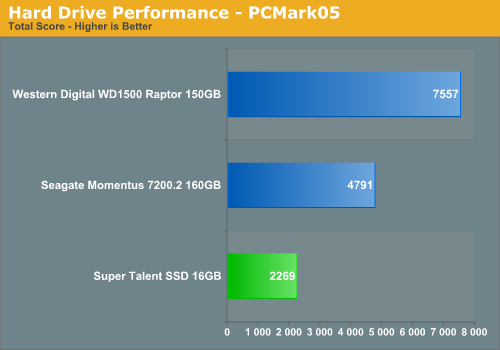
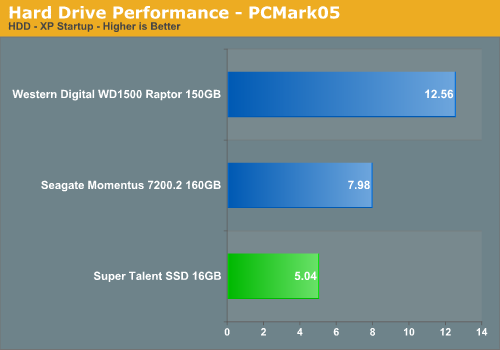
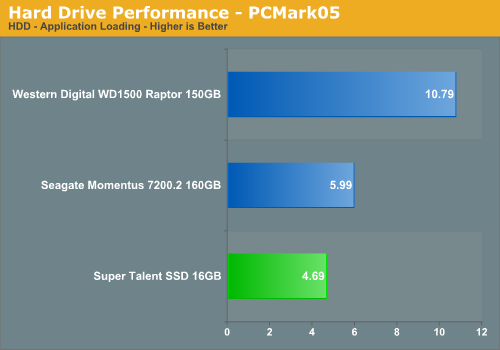
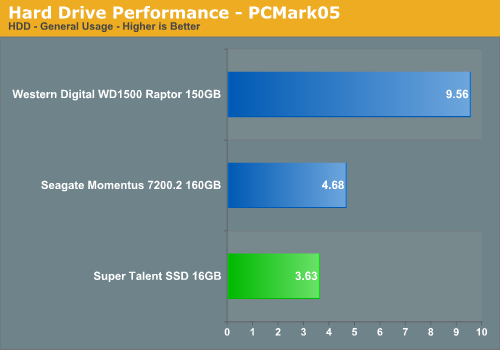
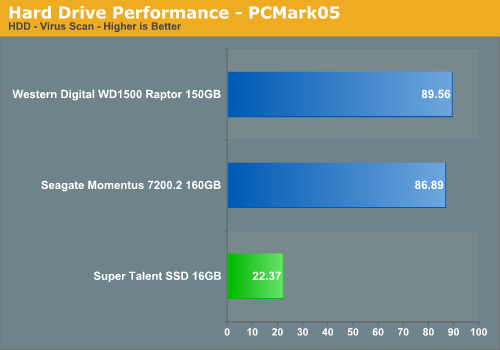
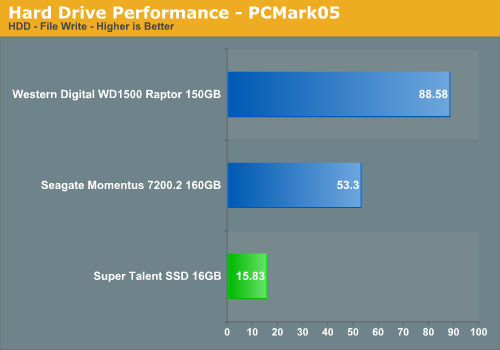
Our PCMark05 results show the Super Talent drive performing as expected considering the read and write speeds are limited to an average of 25 MB/sec. Solid State Drives feature extremely low access times that are usually in the <1ms range and with no moving parts the first three PCMark05 test that feature read speeds over write speeds show the drive being competitive to some degree even with the industrial usage design.
We fully expected the File Write tests to show major differences based on the low write speeds of the disk and it does when compared to our other test drives. However, these differences are minor when considering the drive will be used in applications where write speeds are not paramount to the performance of the drive. The results in PCMark05 will be reproducible in our limited test suite.
We are utilizing the HDD test suite within PCMark05 for further comparative hard disk scores as it provides a mixture of actual application results and specific read/write percentages utilized within these programs. It is also a readily available benchmark that others can use for comparative purposes. The program utilizes the RankDisk application within the Intel iPeak SPT suite of tools to record a trace of disk activity during usage of real world applications. These traces are then replayed to generate performance measurements based upon the actual disk operations within each application. The HDD test suite contains 53% read and 47% write operations with each trace section utilizing varied amounts of read or write operations. Additional information about the test suite can be found in PDF format here PCMark05 whitepaper.
The PCMark05 test results are based upon the following trace runs:
Windows XP Startup: This test consists of 90% reading and 10% writes that tracks XP activities at start-up.
Application Loading: This test consists of 83% reading and 17% writes that tracks the opening and closing of the following programs.
- Microsoft Word
- Adobe Acrobat Reader
- Windows Media Player
- 3Dmark 2001SE
- Leadtek WinFast DVD
- Mozilla Internet Browser
- Opening a Microsoft Word document, performing grammar check, saving and closing
- Compression and decompression using WinZip
- Encrypting and decrypting a file using PowerCrypt
- Scanning files for viruses using F-Secure Antivirus
- Playing an MP3 file with Winamp
- Playing a WAV file with Winamp
- Playing a DivX video using the DivX codec and Windows Media Player
- Playing a WMV video file using Windows Media Player
- Viewing pictures using Windows Picture Viewer
- Browsing the Internet using Microsoft Internet Explorer
- Loading, playing and exiting a game with Tom Clancy's Ghost Recon
File Write: This test consists of 100% write activities by writing 680MB of files onto the hard disk.






Our PCMark05 results show the Super Talent drive performing as expected considering the read and write speeds are limited to an average of 25 MB/sec. Solid State Drives feature extremely low access times that are usually in the <1ms range and with no moving parts the first three PCMark05 test that feature read speeds over write speeds show the drive being competitive to some degree even with the industrial usage design.
We fully expected the File Write tests to show major differences based on the low write speeds of the disk and it does when compared to our other test drives. However, these differences are minor when considering the drive will be used in applications where write speeds are not paramount to the performance of the drive. The results in PCMark05 will be reproducible in our limited test suite.










44 Comments
View All Comments
eguy - Monday, May 14, 2007 - link
These guys are knowledgable and sell the Super Talent and other SSDs. They are even working on a RAID0 SSD box! http://www.dvnation.com/nand-flash-ssd.html">http://www.dvnation.com/nand-flash-ssd.html .There are not many SSDs that can benefit from RAID0. The issue is that the CONTROLLERS used IN these disks max out in speed before the NAND chips will. That means that the Samsung NAND chips while capable of 60+MB/S are throttled by a controller than in some cases will only do 25MB/S. In a hard disk, the media transfer rate is lower than the controller's bandwith. The hard disk controller can do 150MB/S+. So in hard drive land a 50MB/S hard disk + another 50MB/S hard disk = about 100MB/S in RAID0. But I've seen a 25MB/S SSD + 25MB/S SSD =, you ready for this? 17MB/S. DV Nation is predicting they will have a RAID0 box out later this year that can outperform a single SSD. They couldn't get the ultra-fast IDE Samsungs to RAID up. I told them I wanted to do 2X SATA SSDs in RAID and they said their customers had not had success with that.
I'm thinking newer models might in the future.
Also don't get bent out of shape between SATA and IDE in SSDs. IDEs are just as fast, if not faster than SATA. Even in the world of hard drives, IDE vs SATA does not matter in speed. Drive makers CHOOSE to make their fastest consumer drives in SATA, but even a 10 year old IDE interface is capable of 166MB/S, right? My 10,000 RPM SATA RAPTOR can only to 75MB/S, so IDE would be just as fast for it.
Modern SSDs will outlast hard disks. Forget the write cycles. They are rated between 1,000,000 and 5,000,000 write cycles. The problem is, hard disks are not rated in write cycles. For an apples to apples comparison, you need to use MTBF (mean time between failures). SSDs are rated much MUCH higher in that regard. Look at documentation on Sandisk's site, Samsungs, all the big manufacturers and independent reviewers. I've seen math done that shows life of up to 144 years! (!??!!)
Bladen - Tuesday, May 8, 2007 - link
I think many of us would be interested in seeing exactly what RAID 0 can do for these things. It would be good to compare 2x RAID 0 of this drive vs 2x RAID 0 of the Sandisk and/or Samsung ones, and compare that to 2x RAID Raptors too.Just be particularly flattering to Sandisk or Samsung to get another drive of them if you can.
abakshi - Tuesday, May 8, 2007 - link
If I recall, the price point for the current (OEM) SanDisk 32GB SSD is $350 in volume. If those (which are shipping in laptops today) have much better performance than this, why would anyone use this in an industrial/medical/etc. application - pay $150 more for 1/2 the space and a slower drive? Am I missing something here?Also, any idea of when are the SanDisk/Samsung/etc. consumer SSD's coming out?
PandaBear - Thursday, May 10, 2007 - link
Yeah, longer life span if you do not read/write a lot. HD wear out regardless of use but flash usually doesn't. Also, industrial environment don't usually use a lot of storage but have a lot of packaging limitation (can't fit a large HD or don't have enough cooling) that rule out HD.Check out Hitachi's Endurastar HD, they are rated for industrial grade but are more expensive and smaller capactiy. Now that is a better comparison.
MrGarrison - Wednesday, May 9, 2007 - link
Samsung's SSDs are already out. Check Newegg. They are even available here in Sweden.I would buy two of their 16GB SSDs if only they had SATA interface. Oh well, guess I'll have to wait a couple of months more.
Calin - Tuesday, May 8, 2007 - link
Interesting review, but I have a small problem with it:Please, compare the cost per gigabyte of the 2.5" SSD drive with the cost per gigabyte of other 2.5" mechanical hard drives.
While totally correct, the cost of $0.4/GB of current 3.5", high-capacity hard drives is much lower than the cost for the 2.5" mechanical hard drives (somewhere around the $1/GB, or slightly higher for low capacity drives).
The 16GB 2.5" SSD don't fit in the place of a Raptor, and a Raptor won't fit in the place of a SSD 16GB drive.
Thanks
bob4432 - Monday, May 7, 2007 - link
are the power requirements for the seagate 7200.2 correct - .87W / 2.42W?MadBoris - Monday, May 7, 2007 - link
I'm just very disappointed with performance on these for consumer PC usage.I mean this is solid state memory.
Somebody is going to break this wide open with performance someday, because flash is just so damn slow it's painful to write this.
Making a RAMDRIVE today (using a portion of system RAM) on our PC's is thousands fold faster only lacking volatility for persistent data.
Just duct tape some RAM sticks together on a PCB, hook a duracell to it and we should be good. ;) Well, you get the idea...We need to leverage performance of RAM today.
Wake me up when this technology gets interesting.
Shadar - Monday, May 7, 2007 - link
The article seems to imply that transfer rates are the problem with performance. In this case a RAID of 2 or 4 of these in RAID-0 would drastically increase performance. 4 of these in a Raid 0 should crush a standard hard drive as the transfer rate would always be higher and it would have blazing access times.Though I must wonder why the CF cards are not raided as it is inside this drive. Why wouldn't the manufacturer be using 4 4GB cards in a raid array to boost the speeds themselves inside the box?
yyrkoon - Monday, May 7, 2007 - link
Yeah sure, lets take something with an already severely limited lifespan, and decrease the lifespan by abusing it with RAID . . . Lets not forget that 4 of these drives would set you back over $2000, and it makes even less sense to do so.
I have done intesive testing in this area of my own, and to tell you the truth, *you* do not need that type of performance. *you*, of course meaning, you, me, or the next guy. Besides all this, if you really want to waste you money in the name of peformance, why dont you get 4x or more servers, capable of supporting 32 GB of memory each, use iSCSI, export 31GB of ram from each server, and RAID across those. If you're worried about redundancy, toss in a couple of Raptors into the initiator, and run RAID 0+1, or RAID 10 for redundancy . . .